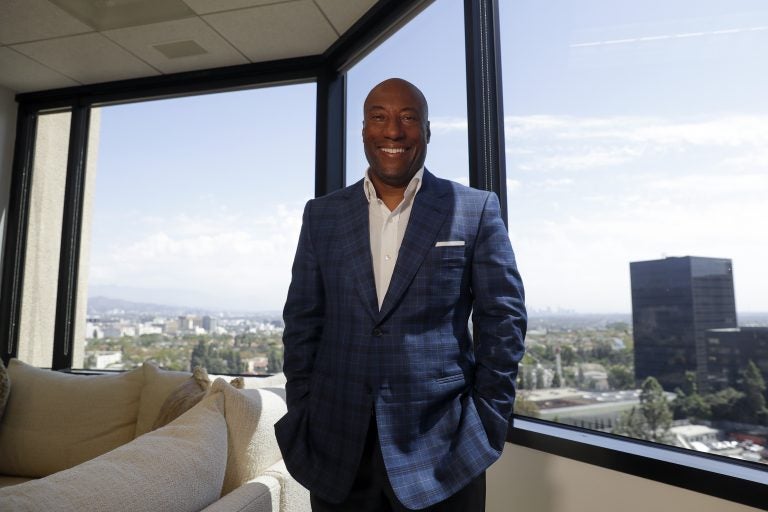Civil rights advocates: Comcast SCOTUS decision could be ‘devastating’
The U.S. Supreme Court is weighing two interpretations of a Reconstruction-era law created to protect against racial discrimination.
Listen 2:21
Comedian and media mogul Byron Allen poses for a picture Thursday, Sept. 5, 2019, in Los Angeles. The Supreme Court will hear arguments Nov. 13 in a $20 billion lawsuit Allen filed against Comcast, with the outcome also affecting a $10 billion case he filed against Charter Communications. (Chris Carlson/AP Photo)
Lawyers for Philadelphia-based Comcast Corp. will be in Washington, D.C. on Wednesday for a high-stakes — and potentially precedent-setting — civil rights case before the U.S. Supreme Court.
The proceeding is rooted in a years-long legal battle with an African-American-owned media company, but could have a broader, some say “devastating” impact on a common legal defense used in racial discrimination claims if the high court sides with Comcast.
“It could set up a battery of cases that will serve as a barricade for black people to really participate in the economic life of this country,” said Rodney Muhammad, president of the Philadelphia chapter of the NAACP.
The case hinges on how the high court chooses to interpret the Civil Rights Act of 1866, a Reconstruction-era law that gave formerly enslaved African-Americans “the same right to make and enforce contracts as is enjoyed by white citizens.”
The “catch-all” provision can be used in discrimination cases that deal with business negotiations, but it could also be used if, for example, someone was refused a hotel room because of his or her race.
The court will decide whether the law is applicable in cases where racial discrimination wasn’t the only reason a contract was denied.
Wednesday’s oral arguments are tied to a $20 billion civil rights lawsuit filed by Byron Allen in 2015. The media mogul alleges Comcast didn’t want to carry his company’s seven high-definition stations because Entertainment Studios Networks is African-American-owned.
In court documents, Allen alleges that a Comcast executive told him it refused to contract with Entertainment Studios because the company didn’t want to “create any more Bob Johnsons,” referring to the African-American founder of Black Entertainment Television, the groundbreaking cable station better known as BET, which Comcast carries.
Comcast denied the allegations, calling the lawsuit an “an uphill battle against common sense.” The company says it “took a pass” on Allen’s stations — including JusticeCentral.TV, Cars.TV, ES.TV, MyDestination.TV, Pets.TV, Comedy.TV, and Recipe.TV — because there was “insufficient consumer demand.”
A lower court sided with Comcast three times, saying Allen’s company didn’t make a strong enough case that “race, rather than legitimate business reasons, led to the refusal.”
But California’s Ninth Circuit Court of Appeals disagreed in 2018, saying there was enough evidence to show that racial discrimination played “at least some role” in Comcast’s decision not to contract with Entertainment Studios.
The four-page decision points to a variety of allegations, including that Comcast offered contracts to “lesser-known, white-owned” networks “at the same time that it informed Entertainment Studios that it had no bandwidth or carriage capacity.”
“The Ninth Circuit Court of Appeals ruled wisely. There are many possible explanations for any business decision. It is very difficult to prove that race was the only factor in deciding against doing a deal,” said Allen in an op-ed he penned for Deadline.com
In an amicus brief filed in support of Comcast, the U.S. Department of Justice argues the Civil Rights Act of 1866 requires, by default, that plaintiffs in racial discrimination lawsuits prove that race was the sole driver of a company’s decision not to do business with another company, for example. If other factors played a part, the statue wouldn’t apply.
A Comcast spokesperson added that the company is not seeking to undermine the law or create a higher burden of proof. Instead, it’s asking that the law “be interpreted the same way it has been interpreted for decades across the country.”
Lawyers for the National Association of African-American-Owned Media will argue the statute only requires that race be a “motivating factor” in the decision-making process, and that ruling otherwise would sap the legal strength out of this anti-discrimination law.
“The second approach is more consistent with the way in which people think about causation and it also provides a greater deterrent to discriminatory behavior,” said University of Pennsylvania law professor Regina Austin.
It will likely be several months before the U.S. Supreme Court rules on the case.
In a letter sent to Comcast executives, Rev. Bernice King, a daughter of Martin Luther King Jr., said siding with the company will “dismantle” a pivotal civil rights provision.
“Are you prepared to say business decisions based on racism are acceptable if combined with other non-racist reasons?” King wrote to Comcast CEO Brian Roberts.
Muhammad, the NAACP president, agrees, saying the case could be a “devastating blow to the civil rights movement.”
The Associated Press contributed to this story.
WHYY is your source for fact-based, in-depth journalism and information. As a nonprofit organization, we rely on financial support from readers like you. Please give today.





